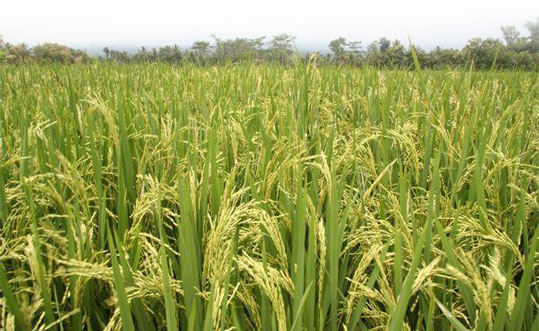Kuwaiti Farmer grow the Basmati Rice in Kuwait
 A Kuwaiti farmer has managed to grow basmati rice in Kuwait for the first time. Yusuf Al-Kirbani told KUNA, Kuwait News Agency, that despite tough conditions he has grown Indian basmati rice on his farm in the Al Wafra area.
A Kuwaiti farmer has managed to grow basmati rice in Kuwait for the first time. Yusuf Al-Kirbani told KUNA, Kuwait News Agency, that despite tough conditions he has grown Indian basmati rice on his farm in the Al Wafra area.
He said basmati requires heavy neutral soils like clay, clay loam and loamy, that are capable of holding water for longer periods, So he used cultivation basins without holes to hold water. He also attempted to produce black tomatoes and white strawberry.
*Basmati is a variety of long, slender grain aromatic rice which is traditionally from India and Pakistan. In 2014, India supplied 65 percent of the overseas basmati rice market. ‘Basmati’ derives from the Sanskrit word vasmati, meaning ‘fragrant’. It is believed to have been cultivated in the Indian subcontinent for centuries.
Kuwait News
- Events in Kuwait
- Kuwait reports 1 new coronavirus death
- Two new deaths in Kuwait due to Coronavirus
- Coronavirus cases in Kuwait as of 17.04.2020
- EMPLOYERS OBLIGATED TO PAY WORKERS DURING CURFEW PERIOD
- MOI grants temporary residence for expiring visas
- Kuwait sets venues to host Indians desiring to go home
- Video – Power supply to 32 buildings of expat bachelors to be cut
- May need to extend social distancing until 2022 – Washington
- Appointment shopping during curfew
- Qatar Airways started operation for 40 connected destinations
- 25% rent discount for Apr, May & Jun to all Kuwaiti and expatriate tenants
- Outbound flights from Kuwait Airport to USA
- Over 250,000 expats lost their jobs in Kuwait
- Residence for Family visa and Self sponsor renewal for only 1 year
- 161 New Coronavirus cases in Kuwait
- 83 New Coronavirus cases in Kuwait
- Renewal of driving license for 15 yrs and 3 yrs
- Renew your civil id online and collect it after holidays
- Coronavirus in GCC as of 08.04.2020
- Residence Violation Penalty applied from 1st March

Comments (1)
Filed in: All • Expats in Kuwait • Info • Local News • News









Very interesting how technology makes it possible to grow rice in such hard climate conditions